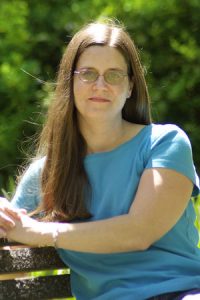Smart Energy: Harvesting Solar Energy
By Melanie MacKinnon

Melanie MacKinnon
There are many ways to harvest and use solar energy, the energy from the sun. These include solar electricity, solar water heating and passive solar. With many applications, solar is useful for homes, businesses, agriculture, municipalities and more.
Passive solar doesn’t use active mechanical or electric devices. Greenhouses and clotheslines are common examples of passive solar energy. Passive solar building design takes advantage of the building’s site, climate and materials to minimize energy use.
The building is placed to take advantage of the southern exposure, and windows, walls and floors collect, store and distribute solar energy in the form of heat in the winter, and reject solar heat in the summer. Another example of passive solar is a solar tube light. A solar tube light installed in the roof uses mirrors to direct natural daylight into the home.
Solar water heating systems collect the sun’s energy for domestic hot water or space heating. Solar water heating is especially beneficial when large amounts of hot water are needed for households, apartment buildings, swimming pools and commercial operations, like laundromats and breweries.
Solar photovoltaic (PV) systems use solar panels to convert the sun’s energy into electricity. The solar electric system can be connected to a customer’s utility service, lowering their electric bill. These are utility-tied or grid-tie solar PV systems.
While a solar electric system doesn’t require a backup system like batteries to provide power, a system can be designed to include batteries to provide backup electricity when the utility electrical grid has a power outage, or for off-grid applications.
If you can’t or don’t want to go solar on your own, community solar may be for you. Community members, businesses and organizations can join together to share the costs and benefits of a solar electric system. Community solar projects are being explored in Douglas County, and opportunities to participate are coming.
Some solar electric systems are not connected to the electric utility at all, using solar panels and batteries to store and provide power. These off-grid systems require careful planning, the use of energy saving appliances and often, additional energy sources, like hydro, wood or fuel. Off-grid systems can power small homes, cabins, as well as remote communication and fire towers.
There are many examples of smaller stand-alone solar electric systems. These provide convenient, point-of-use electricity far away from utility powered electrical outlets.
Solar water pumping uses one or more solar panels to directly power an efficient DC pump to move water out of one location, like a stream and into a livestock tank, storage cistern or straight into a garden. This can expand water use to other areas of your property, keep the water way clean and store water for later use.
Smaller stand-alone solar power devices include gate openers, attic fans, lights, fountains and road signs providing convenient power right where it’s needed.
These and other forms of solar energy provide a variety of benefits. Harvested locally, solar energy contributes to our individual and community energy independence and security. Solar is clean, renewable energy. Solar energy can lower and stabilize energy costs. In some cases, solar can provide convenience away from the utility grid or electrical outlet.
Combining solar energy with energy saving technology and actions is a great strategy. Energy saving behaviors, equipment, insulation and weatherization can all add to solar energy savings. In many cases, there are incentives and resources available that can help you explore, evaluate and lower the cost of renewable energy and efficiency energy projects.
Big and small, there are many ways to use solar energy. And with so many benefits, there’s something for everyone to appreciate. Douglas County residents, businesses, non-profit organizations and local government can and do benefit from solar energy in our community. Solar helps provide energy independence, security, savings and convenience.
Melanie MacKinnon is an independent consultant providing energy and grant writing services.
For tips on other ways to save and produce energy, visit dcsmartenergy.org. Douglas County Smart Energy is a project of the Douglas County Global Warming Coalition. For more information about the Coalition, call 541-672-9819, or find them on Facebook at DCSmartEnergy.